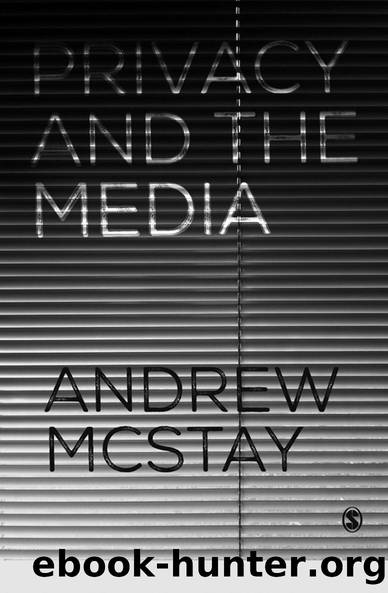Privacy and the Media by Andrew McStay

Author:Andrew McStay [McStay, Andrew]
Language: eng
Format: epub
Tags: Social Science, Media Studies, Language Arts & Disciplines, Communication Studies, Criminology
ISBN: 9781526413321
Google: q2ECDgAAQBAJ
Publisher: SAGE
Published: 2017-03-20T03:37:40+00:00
Forced Openness
This issue has arisen in privacy studies. Richard Posner, a privacy and law scholar details this problem. He controversially argues that allowing people privacy is not defensible because people use privacy to conceal and selectively disclose information. Whereas academics that study privacy mostly agree that privacy is positive overall and has to do with autonomy, control over self-presentation, and the management and sharing of information, Posner takes privacy to task for precisely this reason. For Posner privacy is very much connected to the negative ideas of withholding and concealing, particularly in regard to personal uses of information. He argues that by attempting to manipulate the flow of information, this is tantamount to a wish to control othersâ perceptions. He says: âIt is no answer that people have âthe right to be let alone,â for few people want to be let alone. Rather, they want to manipulate the world around them by selective disclosure of facts about themselvesâ (1983: 234).
Posnerâs point is that if we want the world to be better and more accepting, we should tend towards openness and removal of barriers that impede the flow of information. His examples include full disclosure of early dealings with the law, but also sexuality and minor mental illnesses. Although these might cause irrational reactions by employers, Posner argues that it is wrong to withhold such information from public view. He argues that if informational transparency were the norm, in time irrational prejudices would be removed from society. When we consider the earlier statistic that 10.5 million of the UKâs 64.1 million have a criminal record, one can see his point. There is an appeal to this argument. After all, who would not want to reduce prejudice? The problem is that this requires forced openness. This would create social risks for stigmatised groups and, essentially, calls for risk and a significant sacrifice by them to enlighten the rest of us. Further, although openness can generally be said to be a good principle, it is not clear what practical net positive results would be gained by forced openness.
Real world cases have a habit of complicating philosophical principles such as transparency and openness. Consider the following case study about a woman called Sonia. This was presented by Chris Stacey, co-director of Unlock, at a conference I attended in 2015, although it is also available on Unlockâs website.10
Download
This site does not store any files on its server. We only index and link to content provided by other sites. Please contact the content providers to delete copyright contents if any and email us, we'll remove relevant links or contents immediately.
| Automotive | Engineering |
| Transportation |
Machine Learning at Scale with H2O by Gregory Keys | David Whiting(4295)
Never by Ken Follett(3937)
Urban Outlaw by Magnus Walker(3392)
OPNsense Beginner to Professional by Julio Cesar Bueno de Camargo(3283)
Sapiens and Homo Deus by Yuval Noah Harari(3068)
Will by Will Smith(2911)
A Short History of Nearly Everything by Bryson Bill(2689)
Hooked: A Dark, Contemporary Romance (Never After Series) by Emily McIntire(2550)
Rationality by Steven Pinker(2352)
Borders by unknow(2303)
The Becoming by Nora Roberts(2188)
Holy Bible (NIV) by Zondervan(2123)
A Short History of War by Jeremy Black(1842)
HBR's 10 Must Reads 2022 by Harvard Business Review(1839)
The One Percenter Encyclopedia by Bill Hayes(1825)
Freedom by Sonny Barger(1794)
Go Tell the Bees That I Am Gone by Diana Gabaldon(1754)
Five Ways to Fall by K.A. Tucker(1737)
Girls Auto Clinic Glove Box Guide by Patrice Banks(1726)
